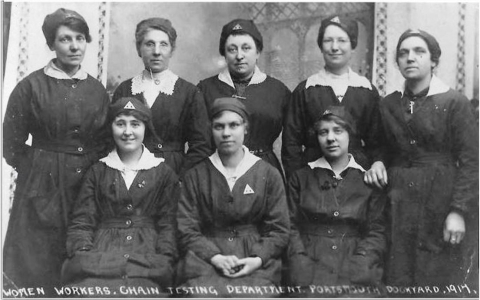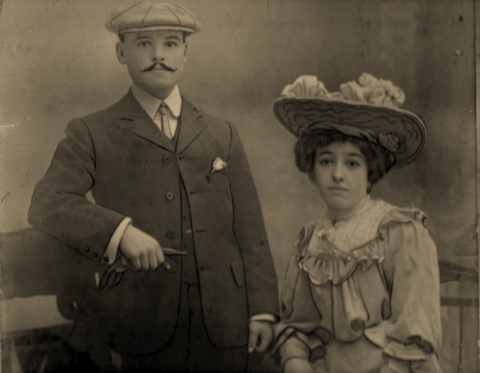

Research shines a light on the women who worked at Portsmouth Royal Dockyard during the First World War, known as the Triangle Girls
29 March 2023
8
Women workers who took up jobs in Portsmouth Royal Dockyard during the First World War are finally being celebrated for their contributions.
Researchers and volunteers have spent years uncovering the forgotten stories of the Triangle Girls, a name given on account of the triangular ‘On War Service’ badges they wore at the time.
Only a very small number of women worked in the dockyard before 1914, initially making flags, before roles including typists, tracers and copyists were introduced. But when war broke out, labour shortages on the home front meant many had to take on non-traditional jobs for their gender at the time.
These included welding, buffing, drilling, engraving, and woodturning in the city’s docks. In fact, more than 2,000 female workers contributed to the war effort there.
The Triangle Girls helped construct the super-dreadnought battleships HMS Queen Elizabeth and HMS Royal Sovereign, and the submarines J1, J2, K1, K2 and K5.
The Yard also repaired 1,658 vessels and refitted 1,200 ships, including 40 battleships and battlecruisers, 25 cruisers and more than 400 destroyers.
However, in 1919 the Restoration of the Pre-War Practices Act forced most women to leave these wartime roles when survivors came home to reclaim their jobs. One Triangle Girl when interviewed years later was asked if she had received a medal, she replied, ‘no dear, they just gave us our cards’.
After securing a National Lottery Heritage Fund grant, the Portsmouth Royal Dockyard Historical Trust (PRDHT) sought the help of Dr Melanie Bassett from the University of Portsmouth to bring these stories to life.
Our research explored the context of their employment during the First World War, the tasks they performed, their working conditions, attitudes of their male colleagues, their personal feelings and the legacy of their service.
Dr Melanie Bassett, Faculty of Humanities and Social Sciences at the University of Portsmouth
She said: “It has been a huge honour working with PRDHT, community volunteers and students from the University of Portsmouth to help shine a light on the vital role women played when men in the city were called away to serve.
“Our research explored the context of their employment during the First World War, the tasks they performed, their working conditions, attitudes of their male colleagues, their personal feelings and the legacy of their service.”
One of the most surprising finds for the research team occurred when one of them discovered that she was related to a Triangle Girl. Cheryl Jewitt came across the name of her own grandmother, Clara Eliza Sillence, in the Portsmouth Dockyard Rate Books.
“This was a family history I never knew about”, explained Cheryl.
“My father had been born during my grandmother’s second marriage, and we didn’t know much about her life with her first husband, James A W Sillence who Clara married on New Year’s Day 1912.
"James was killed in action on October 31st 1914 leaving my grandmother to care for and support my aunt who had not long been born.”

Clara and James Sillence © Portsmouth Royal Dockyard Historical Trust
The story of The Triangle Girls is now depicted on display banners which members of the PRDHT use when giving talks to clubs, societies, institutions and schools.
These include archive material and information gathered from PRDHT, Portsmouth History Centre and Imperial War Museum, as well census records, Parliamentary records and newspaper archives.
Trust Director, Dennis Miles, said: “The invaluable research will ensure that the work and lives of the Triangle Girls will be preserved for future generations to enjoy and appreciate the wider history of Britain at war.”
The project became a reality thanks to the dedicated effort by PRDHT Trustee, the late Colin Lay. The retired headteacher not only had an interest in ships, but a genuine respect for all the employment and further education opportunities that the Dockyard had to offer.
In his honour, PRDHT has also created ‘The Colin Lay Resource Pack for Schools’, which will be free to download from the Trust’s website.
“Colin was very passionate about the production of a resource pack to accompany the project as a teaching aid”, explained Mr Miles.
“Colin’s intention was for teachers to access the information and then tailor it to suit the age groups.
“Part way into the project he was sadly diagnosed with cancer and eventually lost his long battle with this terrible illness in June last year. The world is now a little less bright without him, but we hope to honour his memory by dedicating the resource pack to such a true gentleman."
Secrets of the 1921 Census
January 2022 brought a very exciting moment for interwar historians when the 1921 Census, a survey of 38 million people living in England and Wales, was published. Listen to Dr Melanie Bassett and Deborah Sugg Ryan from the University of Portsmouth discuss insights and mysteries revealed by these documents on the podcast series Life Solved.
